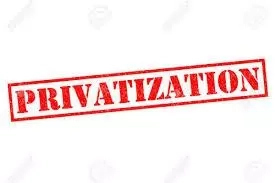Problems And Prospects Of Privatization In Nigeria
The privatization programme can be traced in Nigeria from 1986, through the introduction of structural adjustment programme (SAP) in Nigeria, It starts its existence in 1986, but it was officially legalized in March 1988, when the Nigerian Heads of state, Ibrahim Badamous Babaginda Promulgated a degree establishing the technical committee on privatization and commercialization (TCPC).
The economic principles of deregulation and privatization were first introduced in Nigeria in the 1980s through the policy of structural adjustment programme (SAP).
👉 Relocate to Canada Today!
Live, Study and Work in Canada. No Payment is Required! Hurry Now click here to Apply >> Immigrate to Canada
Since then, government monopolies had disappeared in many industries and over 85 public enterprises (PES) in mining, education, health, agriculture, transportation and telecommunication were transferred, either fully or partially to private owners.
Privatization has been defined in several ways; some of the definitions include:
1. The transfer of ownership, property or business from the government to the private sector. The government ceases to be the owner of the entity or business. It entails the allocation of shares which is meant to be done to have a fair geographical and income groups in the country.
2. The process in which a publicly-traded company is taken over by a few people. The stock of the company is no longer traded in the stock market and the general public is barred from holding stake in such a company. The company gives up the name ‘limited’ and starts using ‘private limited’ in its last name.
Privatization is the process of transferring an enterprise or industry from the public sector to the private sector
The public sector is the part of the economic system that is run by government agencies. Privatization may involve either sale of government-held assets or removal of restrictions preventing private individuals and businesses from participating in a given industry. Various types and techniques of privatization include:
a. Contracting out
b. Management contracts
c. Public/private competition
d. Franchising
👉 Relocate to Canada Today!
Live, Study and Work in Canada. No Payment is Required! Hurry Now click here to Apply >> Immigrate to Canadae. Internal market
f. Vouchers
g. Commercialization
h. Self help
i. Volunteers, corporatization, asset sale, private infrastructural development and operation etc.
Prospects Of Privatization In Nigeria
1. Cost And Privatization
Unlike the case of government produces who have no incentive to hold down production costs, private producers who contract with the government to provide the service have more at stake, hence they are encouraged to perform at higher level for lower cost. The lower the cost incurred by the firm in satisfying the contract, the greater profit it makes.
3. Improved Efficiency
If you work for a government run industry, managers do not usually share in any profits. However, a private firm is interested in making profit and so it is more likely to cut costs and be efficient.
Privatization in Nigeria has shown degrees of improved efficiency and higher profitability. Privatization causes the business to expand independently. The work and the progress are increased very much.
4. Lack Of Interference From Political Leaders
The biggest advantage of privatization is that once a privatization is done completely there is no interference from political leaders and also one does not need to do undue favor to them which in itself is a big boost when it comes to doing business and increasing profitability.
5. Generation of Funds
Government can raise funds to pay off other debts fast because of relieve from financial burden of the public sector enterprises being privatized.
6. Shareholders
It is argued that a private firm has pressure from shareholders to perform efficiently. If the firm is inefficient then the firm could be subject to a takeover. A state owned firm doesn’t have this pressure and so it is easier for them to be inefficient.
7. Competition
Often privatization of state owned monopolies occurs alongside deregulation – i.e. policies to allow more firms to enter the industry and increase the competitiveness of the market.
It is this increase in competition that can be the greatest spur to improvements in efficiency. For example, there is now more competition in telecoms and distribution of gas and electricity.
Problems of Privatization
1. Unemployment
Privatization is understandably viewed as an alarming trend by public employee groups. In some cases, privatization results in layoffs of public sector employees, although governments often reassign them to other government jobs, place them with private contractors, or offer them early retirement programs.
A major concern to the organized labour is the impact of privatization on job security and employment. Workers layoffs, erosion of wages and benefits, and decreased levels of union membership could be parts of labour’s setbacks for embracing privatization.
Privatization in some cases has improved the levels of production and profits, after additional investment, and changes in management and labour practices. Nevertheless, the fear of job loses is the stumbling block to privatization
2. Reduction in Government Revenue
Government no longer receives profits (if it was previously profitable), therefore, the revenue accruing to the government from public sector enterprises becomes shortened as a result of privatization.
3. Public Interest
One of the disadvantages is that the privatized company will no longer operate in the public interest. While a state-owned company primarily serves the citizens of the state, the primary goal of a privately operated company is to make profit. It may make these profits at the expense of its customers without serving them properly.
For example, it may choose the market which is most profitable to operate in and leave less wealthy customers without a service.
4. Monopoly
A natural monopoly occurs when the most efficient number of firms in an industry is one. For example tap water has very significant fixed costs, therefore there is no scope for having competition amongst several firms.
Therefore, in this case, privatization would just create a private monopoly which might seek to set higher prices which exploit consumers. Therefore it is better to have a public monopoly rather than a private monopoly which can exploit the consumer.
5. Short-Termism of Firms
As well as the government being motivated by short term pressures, this is something private firms may do as well. To please shareholders they may seek to increase short term profits and avoid investing in long term projects.
In privatization there is a risk that it may take decisions of starting a project which results in short term benefits but may not good for long term.





